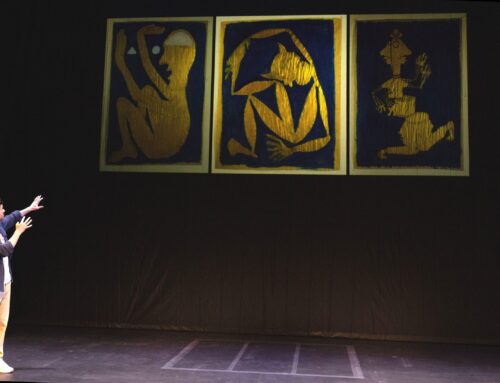Actors’ Shakespeare Project has returned to the stage this fall with a “rebooted” version of Shakespeare’s THE MERCHANT OF VENICE which they have kicked into the 21st century under the direction of the audaciously talented Igor Golyak, artistic director of Arlekin Players Theatre and now, Shakespeare’s so-called “problem play.”
What’s the problem? Is it a comedy or a tragedy? Is it antisemitic or anti-Christian? It’s complicated–just the way I like my Shakespeare. In the play, Shylock (Nael Nacer) the Jewish money lender makes a loan to a prominent Christian merchant Antonio (Dennis Trainor) whose regular currency includes publicly denigrating Shylock. Antonio agrees to secure this loan on behalf of his friend Bassanio (Jesse Hinson) who needs it in order to marry the heiress Portia (Gigi Watson). But here’s the rub: if Antonio defaults on the loan– the price is a pound of his flesh to be paid to Shylock.
As Golyak points out (in an uncharacteristic director’s program note) the play was originally played for laughs and understood as a comedy. That classification is rooted in a western culture that was deeply antisemitic and continues to be so, reaching an apotheosis in Nazi Germany, and with 21st century antisemitic attacks on the rise, is again rearing its ugly head. Golyak’s approach is to point up the antisemitism by playing the material for uncomfortable laughs. And so there are over-broad jokes, campy asides, clownish “commedia dell’arte” crossed with Venetian Carnevale, Grand Guignol, and masks– all propelled by a rambunctious audio mashup of “Cabaret”-like tunes and dippy TV theme songs like “Batman,” “The Dating Game,” “Mission Impossible” etc.
A little of this goes a long way. I was exhausted and found myself relieved every time the text broke through the irony and spoke for itself “unitalicized.” This was extremely effective during Nacer’s “Hath not a Jew eyes” speech when Shylock’s earnestness and incontrovertibly human sentiments were easily brushed off with derision! That was shocking, and challenged my notion that no one could argue with what Shylock said and dispute his humanity, and that his listeners would hear that speech and see how true it was— and they didn’t! Is this how Shakespeare’s audiences heard that speech?
I also appreciated the effectiveness of the use of the mask here to examine identity. Shylock as played by the masterful Nael Nacer in another very physical and fully-inhabited performance, wears a mask of grotesquely exaggerated semitic features, and behaves the way society has cast him, his real self and humanity hidden, but not from us, the audience. Again, when the mask is dropped, it’s powerful. Indeed, little is what it seems on the surface as discovered by Portia’s suitors who wrongly chose the gold and silver caskets, instead of the lucky man who won her hand by choosing the lowly lead casket which held her portrait inside.
In these ways, the director has effectively tapped into the cultural milieu in which Shakespeare’s play was originally received, a milieu which Shakespeare was certainly a part of— and was undoubtedly questioning. (I had a very distinguished professor of Shakespeare, the late great Wylie Sypher at Simmons College, who read the play as an indictment of a Christian society rife with hypocrites, since Shylock attempted to use that society’s own merciless logic against them in order to exact his due, little realizing he would NEVER win at their game.)
Indeed, Shakespeare gives Shylock the play’s best speech: “Hath not a Jew eyes…” and caps it off with “And if you wrong us, shall we not revenge? If we are like you in the rest, we will resemble you in that.” Earlier he says, “The villainy you teach me I will execute.” And certainly Portia who boasts the “quality of mercy” in the play’s climax, shows none to Shylock when she eviscerates his case with an even sharper reading of the law, requiring him to forfeit his wealth, his daughter–and in a final twist of the legal knife– his religion by converting to Christianity. After that, the hanging with which he’s also threatened seems almost inconsequential. Throughout, the Christians have not turned the other cheek, or loved ALL of their neighbors; they have treated Shylock as subhuman, which is what in their own minds must absolve them. If Shylock is not human, he is not worthy of their empathy and Christian values do not apply.






Leave A Comment
You must be logged in to post a comment.